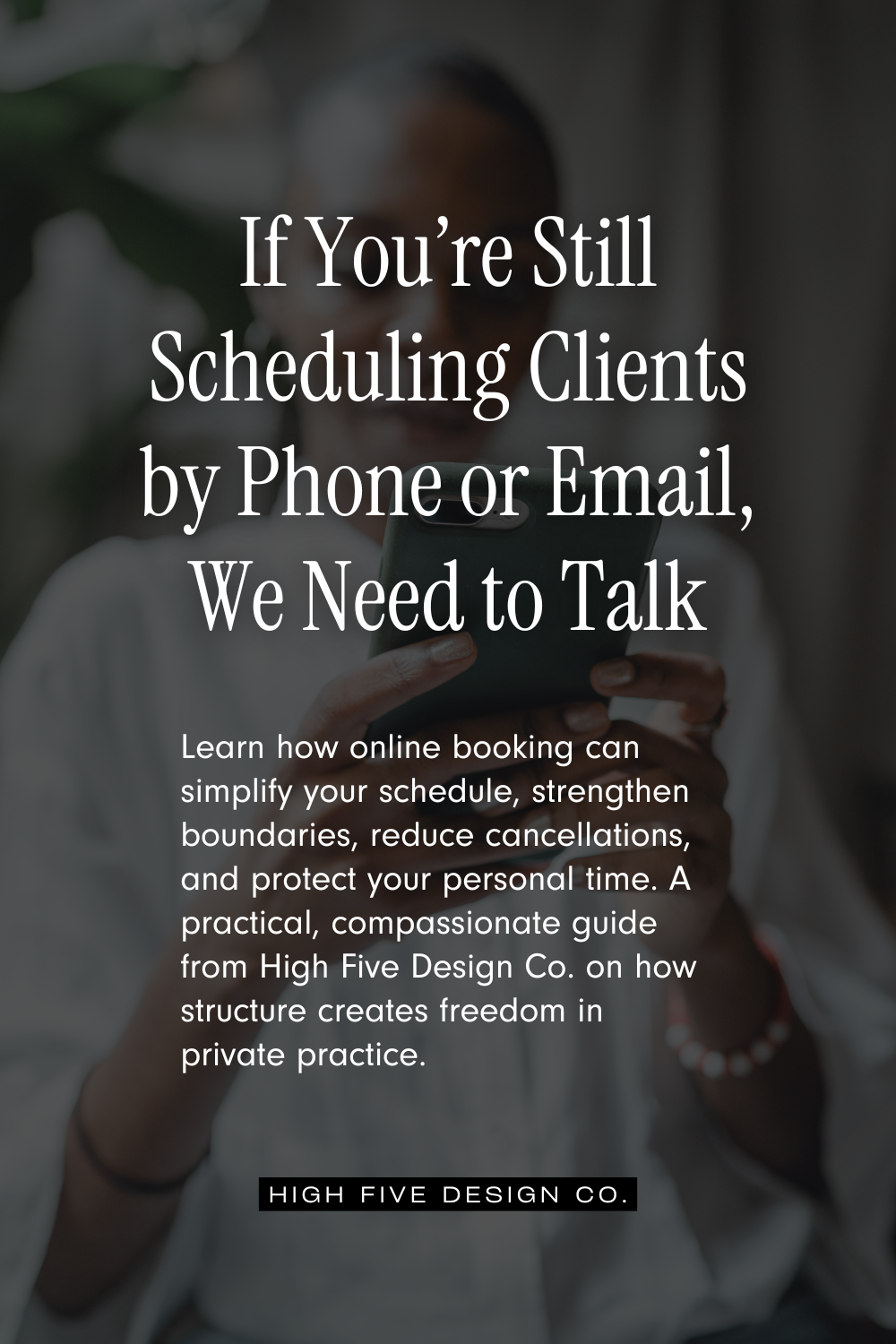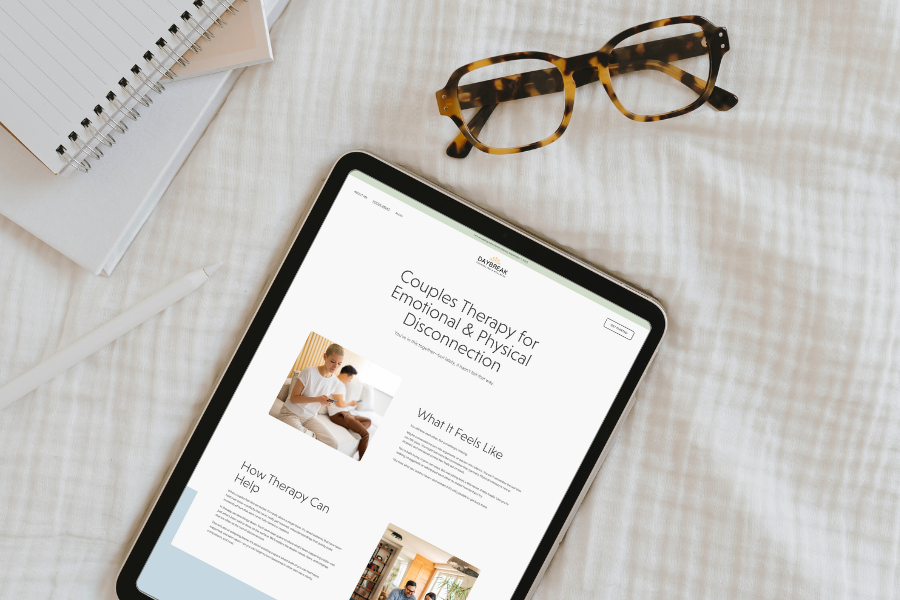If You’re Still Scheduling Clients by Phone or Email, We Need to Talk
If You’re Still Scheduling Clients by Phone or Email, We Need to Talk
You probably didn’t plan to become your own receptionist, but here you are, fielding calls, writing emails, and managing your calendar on top of everything else. When you started your practice, it probably seemed like part of the job. Someone had to handle the logistics, so it made sense that it would be you.
Yet if you’re still juggling client scheduling through emails, texts, or phone calls, you’re spending a huge portion of your time managing logistics instead of doing what you actually love.
I get it. You’re trying to be flexible, available, and accommodating. You don’t want clients booking into times you can’t actually take. You’ve never built the habit of setting a recurring schedule, and the idea of “locking it in” makes you nervous. You tell yourself that handling scheduling manually keeps things personal and controlled.
But here’s the truth: avoiding online booking doesn’t give you more control. It keeps you stuck in chaos, resentment, and scarcity.
Online booking isn’t about being rigid or robotic. It’s about setting a structure that supports your time, your energy, and your clients’ independence.
Let’s talk about what’s really going on when you avoid it, what you’re losing because of it, and why you’ll never go back once you try it.
Why Therapists Avoid Online Booking
Let’s name the fear.
“Clients will book whenever they want.”
They can’t. They can only see the availability you choose to show them. You’re still in charge of your schedule; you’re just not manually approving every move.
“I move my hours around all the time.”
That’s actually the bigger problem. Constantly shifting hours to accommodate others is exhausting and breeds resentment. A set schedule isn’t confining; it’s stabilizing. It lets you plan your week around your life instead of around everyone else’s.
“I can’t trust myself to keep it updated.”
You can. It takes seconds to block off time for appointments. Many EHRs sync automatically with Google Calendar, so when you add something personal, it’s instantly removed from client availability.
“I like to screen new clients before they book.”
Perfect. Keep your consultation calls as the only schedulable option. Just build a short pre-booking form with questions that screen for fit so unqualified clients never even make it to your calendar.
“I’m not good with technology.”
If you can open Zoom, you can manage online booking. Most EHRs have one-button availability settings. Once it’s set, it runs itself.
“I don’t want to lose the personal touch.”
Clients don’t need extra emails to feel cared for. They need clarity, ease, and structure. Accessibility is one of the most compassionate things you can offer.
The Hidden Costs of Avoiding It
When you avoid online booking, you’re not just preserving your sense of control. You’re also making your job harder in ways you might not even see.
You accommodate clients more than yourself.
By keeping scheduling manual, you subtly prioritize their convenience over yours. This reinforces scarcity thinking: “If I make it harder to book, they’ll leave.” They won’t. The right clients respect boundaries.
You create unnecessary admin work.
Every back-and-forth email adds mental clutter. “Does Thursday at 3 work? No? How about Friday morning?” That’s time you’ll never get back. Approving an appointment request takes five seconds.
You make cancellations more uncomfortable.
When clients have to email or call to cancel, they often feel obligated to explain themselves. And then you have to respond. Automation keeps it neutral and simple.
You make it harder to charge your cancellation fee.
If you already struggle with boundaries around cancellations, having clients contact you directly only adds emotional weight. With online booking, the system handles timing and charges automatically.
You lose structure.
Without set hours, you end up working through lunch, skipping breaks, and squeezing in extra sessions you regret. Online booking reinforces consistency. You’ll take real lunch breaks again.
You underestimate how easy maintenance is.
Blocking time or declining a request takes seconds. And because most systems sync with your personal calendar, you rarely have to adjust anything manually.
You sacrifice accountability.
Clients who manage their own appointments become more responsible. They remember your policies, respect your time, and engage more intentionally in therapy.
You invite unnecessary contact.
When clients can request appointments online, they’re far less likely to call you asking for “a few minutes” that turn into half an hour. It protects your personal time from pseudo-crisis calls that aren’t actually emergencies. Clients who truly need urgent help will still reach out, but those who simply need support will schedule within your normal hours.
You keep yourself stuck in a scarcity cycle.
Manual scheduling keeps you in the mindset that your time isn’t worth protecting. It signals that your business still runs on people-pleasing instead of process.
The Real Benefits of Online Booking
When you open your calendar (within limits), everything changes.
You look more professional and trustworthy.
Clients see your system as organized, accessible, and modern. They feel confident you know what you’re doing before they even meet you.
You reduce no-shows automatically.
Most systems send reminders via text or email. You don’t have to remember a thing.
You make rescheduling painless.
When life happens, clients can adjust on their own. They’re more likely to rebook instead of ghost.
You model healthy boundaries.
Every time a client books through your portal instead of emailing you on a Saturday, they’re learning what healthy limits look like in real time.
You protect your emotional energy.
No more inbox pinging at 8 p.m. No more scrolling through texts to find “who’s at 3 p.m. on Wednesday.” You log in, see your week, and that’s it.
You reinforce your brand values.
If you preach autonomy, empowerment, and self-trust, this is your chance to model it through your business systems.
You protect your personal time.
With online booking, clients who just need “extra time” simply schedule an appointment. Those who don’t truly need immediate support won’t call you. And if you don’t offer phone or crisis sessions at all, online booking makes it easy to eliminate phone contact completely.
You create consistency and predictability.
A structured calendar leads to steadier income, fewer last-minute changes, and more restful weeks.
You actually get to exhale.
When your calendar runs smoothly, your mind quiets. You start to feel the spaciousness you were hoping private practice would bring in the first place.
How to Make It Work (Even If You Don’t Trust Yourself Yet)
You don’t have to overhaul everything. Just build the habit one step at a time.
Step 1: Decide your real working hours.
Pick the days and times you want to see clients. Protect those hours fiercely. If a client’s schedule doesn’t fit, they’re simply not your client.
Step 2: Set it and sync it.
Most EHRs connect to your personal calendar. Add your personal events first, then open availability around them. When something changes, you can block it in seconds.
Step 3: Use screening forms for new clients.
Ask questions that quickly reveal fit: state of residence, insurance, availability, and therapy goals. Display your fees and specializations upfront so clients self-select before they ever book.
Step 4: Automate your cancellation policy.
Use your EHR’s settings to automatically charge for late cancellations. State it clearly in your consent forms and remind clients during the first session. Once you’ve communicated it, you don’t need to revisit it every time.
Step 5: Explain your system confidently.
Add a short note on your website under your “Book a Session” button explaining that all scheduling happens through your secure portal during listed business hours. That transparency reassures clients and sets expectations from day one.
Structure Creates Freedom
Therapists often confuse control with safety. But managing every schedule change manually isn’t safety; it’s survival mode. Real control comes from systems that uphold your boundaries even when you’re not actively defending them.
When you build a clear structure, you don’t lose connection with your clients—you gain peace of mind. You become more present in your sessions, more consistent in your care, and far less exhausted by the day-to-day.
You can’t create a sustainable, balanced practice while operating like an on-call receptionist. Online booking isn’t a loss of control. It’s proof that you’ve finally taken it back.
Ready to Simplify?
If you want a website that helps you streamline every part of your private-practice workflow—from booking to branding—start with a High Five Design Co. template or a Custom One-Day Website. Your systems should work as beautifully as your therapy does.
Pin it!
Some of My Favorite Private Practice Tools
Resources and Referral Links




































